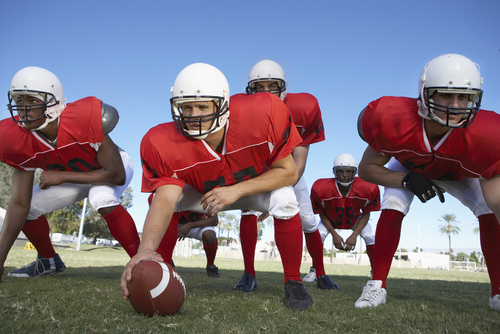Concussions are common in youth sports. It is estimated that as many as 3.8 million concussions occur in America per year during competitive sports and recreational activities. As many as 50% of the concussions may go unreported. Recognize, respond to, and minimize the risk of concussion.
What sports expose children to concussions?
Boys’ sports accounted for 53% of athlete-exposures and 75% of all concussions. Football accounted for more than half of all concussions, and it had the highest incidence rate (0.60). Girls’ soccer had the most concussions among the girls’ sports and the second-highest incidence rate of all 12 sports (0.35).

What are the signs of a concussion?
- Can’t recall events prior to or after a hit or fall.
- Appears dazed or stunned.
- Forgets an instruction, is confused about an assignment or position, or is unsure of the game, score, or opponent.
- Moves clumsily.
- Answers questions slowly.
- Loses consciousness (even briefly).
- Shows mood, behavior, or personality changes
What are the reported symptoms of a concussion?
- Headache or “pressure” in head.
- Nausea or vomiting.
- Balance problems or dizziness, or double or blurry vision.
- Bothered by light or noise.
- Feeling sluggish, hazy, foggy, or groggy.
- Confusion, or concentration or memory problems.
- Irritability, just not “feeling right,” or “feeling down”
How can concussions be prevented?
Wear a properly-fitted helmet.
Create a safe sports culture. Enforce the rules of play to avoid unsafe actions.

How do we treat a child with a concussion?
- Seek medical attention right away. A health care professional will be able to decide when it is safe to return to sports. Typically, this is two weeks, but symptoms should be monitored.
- Do not return to play with a known or suspected concussion until evaluated and given permission by a health care professional. Second concussions that occur before you have recovered are very serious. How long it takes to recover is debated. Full recovery is estimated at 100 days.
- Tell your coach and teachers about any recent concussions. Children should be excused from play and major academic assignments while they recover.
Where can I get more information about concussions?
The Center for Disease Control and Prevention – HEADS UP
HEADS UP is a series of educational initiatives, developed by CDC, that all have a common goal: Protect kids and teens by raising awareness and informing action to improve prevention, recognition, and response to concussion and other serious brain injuries.

